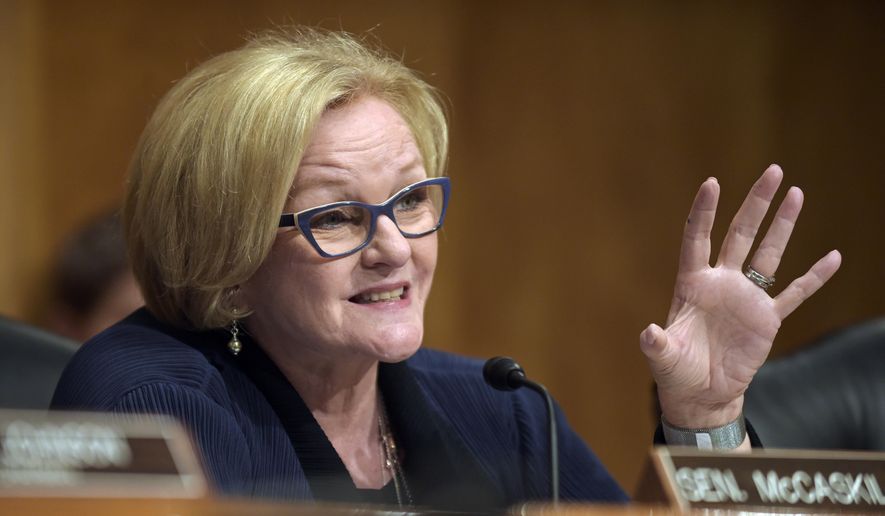Red-state Democrats cried foul Monday over a 2016 law that made it harder for federal agents to freeze suspicious shipments of pain pills, saying Congress and the Obama administration goofed by approving what turned out to be an industry-friendly bill, rather than the stiff crackdown they’d wanted.
The law, which cleared both chambers of Congress with no real opposition, was intended to make sure legitimate pharmaceutical shipments weren’t stopped by federal investigators.
But the result was that it is now “virtually impossible” for the Drug Enforcement Administration to suspend orders of narcotics that could fall into the hands of corrupt doctors or illicit pharmacies, according to internal agency documents used in a Sunday report by The Washington Post and CBS’s “60 Minutes” program.
Now lawmakers who supported the bill last year say they were misled. One of them — Sen. Joe Manchin III, West Virginia Democrat — said the revelations should force President Trump to scuttle his nomination of Rep. Tom Marino to lead the White House’s drug policy office, after the Pennsylvania Republican championed the bill.
Mr. Trump responded by saying he will investigate the issue as he prepares for a major announcement next week to declare the opioids crisis a national emergency.
“We’re going to look into the report. We’re going to take it very seriously,” the president said in the White House Rose Garden.
Mr. Trump called Mr. Marino, an early backer of his campaign, a “good man,” though he added: “We’re going to be looking into Tom.”
Mr. Manchin, who must defend his seat next year, said he was “horrified” by the Post investigation, which described the bill as the “crowning achievement” of drug company lobbyists who teamed with select members of Congress to overcome early opposition from corners of the DEA.
Sen. Claire McCaskill, Missouri Democrat also facing reelection, said she will push to repeal the law.
“Media reports indicate that this law has significantly affected the government’s ability to crack down on opioid distributors that are failing to meet their obligations and endangering our communities,” said Ms. McCaskill, the top-ranking Democrat on the Homeland Security and Governmental Affairs Committee.
The opioids crisis is killing more people than car crashes do in some parts of the country, sparking a scramble in Washington to devise policies that expand treatment options and the use of overdose-reversing drugs, while stemming the flow of powerful opioids to U.S. communities.
Congress, though, has struggled to find a starring role in what is mostly a problem for local authorities.
One new law last year pushed for wider use of naloxone, medication that can combat an overdose.
But Congress also passed the Ensuring Patient Access and Effective Drug Enforcement Act, designed to make sure legitimate pain suffers got their treatment. The bill breezed through Congress without significant opposition, clearing the Senate by unanimous consent.
Language in the law says the DEA has to demonstrate that flagged drug shipments pose a “substantial likelihood of an immediate threat” of death, serious bodily harm or drug abuse before it issues an immediate suspension on distributors or manufacturers.
Previously, it could freeze shipments that appeared to pose an “imminent danger.”
Richard C. Ausness, a University of Kentucky law professor who tracks the opioids issue, said the Post investigation “proves once again that many politicians are unduly influenced by campaign contributions from lobbyists,” while some didn’t bother to pry into the details.
“My guess is that most members of Congress did not know what was in the bill, did not read it, and relied on party leader and others for their information,” he said. “Either that, or they just did not care what the bill would do to DEA enforcement if enacted.”
The Post said the Obama administration had initial concerns but didn’t pursue them because neither the Justice Department nor the DEA objected to the final text.
Some DEA officials told the newspaper they reluctantly relented to get the best result possible in the face of pressure from bill sponsors and industry players, though Sen. Orrin G. Hatch, a Utah Republican who helped craft the law last year, said the goal was to strike a balance between government enforcers and patients who rely on drug companies to manage their pain.
“Not one senator, a member of the House, opposed this bill. Do you know why? Because DEA, the very agency the bill impacts, the very agency that supposedly can no longer do its job because of this legislation, agreed to let it go forward,” Mr. Hatch said.
• Tom Howell Jr. can be reached at thowell@washingtontimes.com.




Please read our comment policy before commenting.